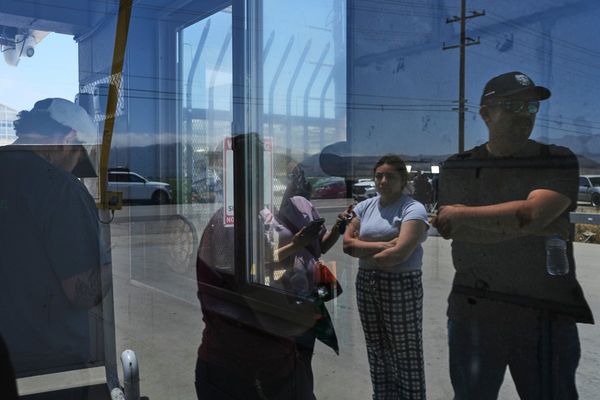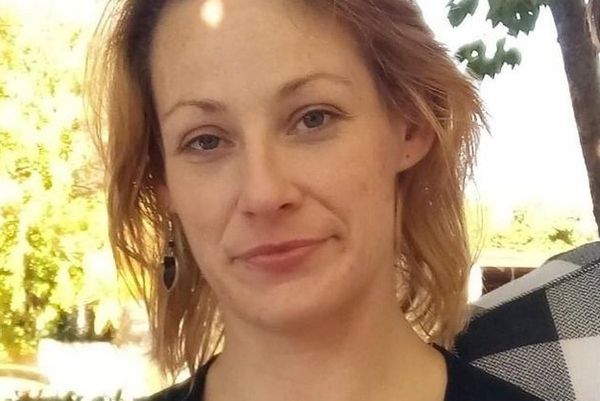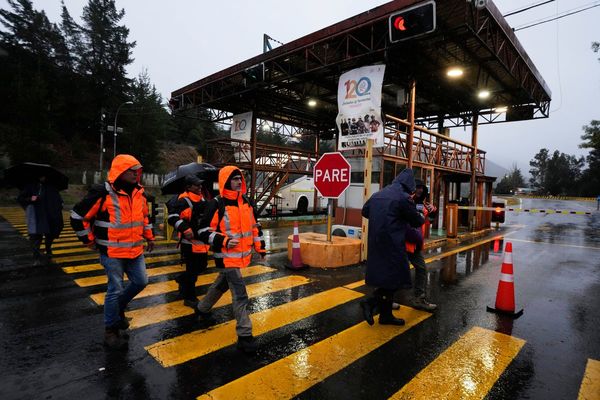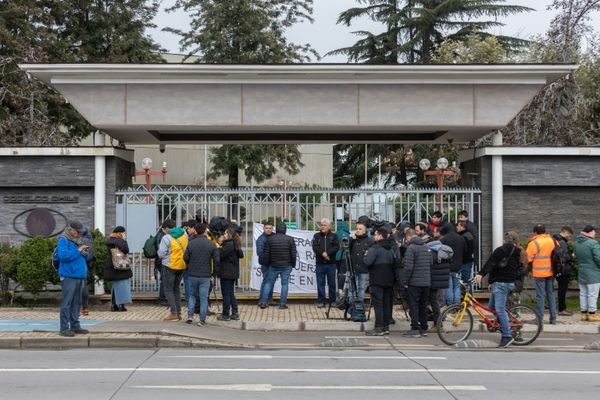
French President Emmanuel Macron has announced he will officially recognise Palestinian statehood before the UN General Assembly in September. While the move has been denounced by Israel and the US and welcomed by Palestinians and Arab countries, the reaction in France has been mixed.
In a letter sent to Palestinian Authority (PA) President Mahmoud Abbas Thursday, Macron confirmed France's intention to press ahead with recognition and work to convince other partners to do the same.
To date, about 144 of the 193 UN member states have recognised a Palestinian state, including most of the global south as well as Russia, China and India. Only a handful of the 27 EU countries do so, mostly former Communist countries as well as Sweden and Cyprus.
Spain, Ireland, Norway and Slovenia did so last year.
If Macron keeps his promise, France – a permanent member of the UN Security Council – will become the largest Western power and the first G7 country to recognise Palestinian statehood.
The decision is mostly symbolic, with Israel occupying the territories where the Palestinians have long sought to establish such a state in the West Bank and the Gaza Strip, with East Jerusalem as its capital.
But it makes Israel appear more isolated on the international stage over the war in Gaza, where Israel has been fighting Hamas militants since the 7 October 2023 terror attack.
Why now?
Macron's announcement on Thursday has been fuelled by the rising global outcry over starvation and devastation in Gaza.
According to the World Health Organization and a number of international aid organisations, Israeli restrictions on humanitarian aid delivery have led to mass starvation in the enclave, though Israel blames Hamas for the suffering.
Macron had been leaning towards recognising Palestine for months as part of a bid to keep the idea of a two-state solution – traditionally defended by France – alive. But he has speeded up the timetable.
"Emmanuel Macron has realised that, in reality, he cannot, unfortunately, expect French diplomacy to have a knock-on effect," says Middle East specialist Frédéric Encel. "A few months ago, he had hoped that Saudi Arabia, or at least one Arab state, would recognise Israel as a price for France's recognition of Palestine. That's obviously not the case," he told RFI.
Faced with Washington's huge influence in the region and France's diminishing influence there, Macron "decided to take the bull by the horns closer to the date of the annual meeting of the UN General Assembly at the beginning of September".
As co-host alongside Saudi Arabia of next week's UN conference in New York aimed at promoting the two-state solution, France was also under pressure to clarify its stance.
"It’s difficult for France to chair a coalition in favour of a two-state solution if France itself does not recognise one of the two states," says Hasni Abidi, director of the Geneva-based Centre for Studies and Research on the Arab and Mediterranean World (CERMAM).

Israel's war and settlements a strategy to block Palestinian state: legal expert
France still counts
Palestinian authorities in both Gaza and the occupied West Bank have largely welcomed France’s decision.
"At last, France is aligning itself with international law – a system that was invented and built in Europe," says Anwar Abu Eisheh, the PA's former culture minister.
"France, like Germany and the United Kingdom, is a major global player with considerable influence," Eisheh told RFI. "And France is also a permanent member of the UN Security Council – that carries weight. This could help accelerate a genuine state-building process."
Given that Palestinians have lost faith in the West, after lots of talk about values and human rights but little evidence on the ground, "this could at least help limit the damage", he argues.
"More than 148 states have recognised a Palestinian state," Abidi notes. "France can only be part of this march of history. What is happening today in Gaza is the result of international resignation and the lack of interest in the Palestinian question and the Palestinian state. And that, in my opinion, is an important factor that led President Macron to anticipate this decision."
Jean-Paul Chagnollaud, a Middle East expert and co-author of the Atlas du Moyen-Orient, agrees. "It's a crucial move. It reasserts the principles of international law and the UN Security Council resolutions calling for a two-state solution. France's recognition of Palestine is a step in that direction."
Going it alone
Encel, however, plays down the importance of Macron’s contribution.
"It won't be a decisive contribution. Firstly, because it will change absolutely nothing on the ground. Secondly, because without the knock-on effect France will lose credibility."
Macron's announcement has indeed opened the door for other major G7 nations such as Britain, Germany and Canada to possibly jump on board.
Chagnollaud says that the announcement was initially scheduled to coincide with a conference in New York in June, which was postponed due to hostilities between Israel and Iran. "At that time, French diplomacy was actively seeking support from other players – Canada and the UK in particular. It was clear that France hoped to bring others on board, not just within Europe, but globally."
In the immediate term, Malta and Belgium have indicated they could be the next EU countries to recognise a Palestinian state but whether bigger international players will follow is far from sure.
British Prime Minister Keir Starmer said on Friday that his government would recognise a Palestinian state only as part of a negotiated peace deal, disappointing many in his Labour Party who want him to follow France.
After discussing with Macron and German Chancellor Friedrich Merz ways to pressure Israel to end its war in Gaza, Starmer said he was focused on the "practical solutions" that he thought would make a real difference to ending the war.
Earlier on Friday, a German government spokesperson said it was not planning to recognise a Palestinian state in the short term and that its priority was to make "long-overdue progress" towards a two-state solution.
Chagnollaud says Germany "remains paralysed by the historical weight of its responsibility for the Holocaust.
And without Germany, Encel insists EU pressure on Israel will be minimal.
"As long as Germany, which is Israel's economic heavyweight and main economic partner within the European Union, does not take this kind of step, the Israeli government will not take the French position into account."
Does Macron’s pledge on Palestine signal a return to France’s ‘Arab policy’?
'Rewarding terrorism'
"Despite the announcement, many Palestinians criticise France for remaining close to Israel, so I wouldn’t call it a breath of fresh air," Encel says. "As for the Israeli government, it will make little difference – they’re a far-right coalition that couldn’t care less what France or most European states do."
Israel has reacted angrily, accusing France of "rewarding terrorism" in reference to Hamas.
In a statement, Hamas welcomed Macron's decision as a "positive step" towards justice and self-determination for the Palestinian people.
Israel argues French recognition of Palestine will encourage Hamas to hold a harder line in ceasefire negotiations but France insists the announcement – which also called for Hamas to be demilitarised – was not about rewarding Hamas but rather "proving it wrong".
"Hamas has always rejected the two-state solution. By recognising Palestine, France is proving this terrorist movement wrong. It is proving the peace camp right against the war camp," Foreign Minister Jean-Noel Barrot wrote on X.
Israel slams French plan to recognise Palestinian state as a 'prize for terror'
Domestic differences
France is home to Europe's largest Jewish and Muslim populations so any decisions relating to Israel and the Palestinians can have an impact on the domestic front.
Announcing his decision, Macron said "the French people want peace in the Middle East".
However, a poll last month found that only 22 per cent were in favour of immediate and unconditional recognition while 47 per cent would accept recognition once Hamas had laid down its arms and released all the Israeli hostages.
Opinion among France's political class is also divided. Jean-Luc Mélénchon, figurehead of the hard-left France Unbowed (LFI) party, which has long defended Palestinian rights, described Macron's decision as a "moral victory". Socialist MP Arthur Delaporte said that faced with famine and ongoing massacres "the priority is to stop the violence," adding that recognition of Palestine, while not enough, is a step in the right direction.
The conservative Republicans party (LR) said that while it had "always been favourable" to recognising a Palestinian state, the conditions were not met.
"At present it would give victory to Hamas – a terrorist organisation – while the [Israeli] hostages have still not been freed", it wrote in a statement.
The far-right National Rally (RN) party, closely aligned to Israel's right-wing Likud, said Macron's decision was "precipitated". RN lawmaker Julien Odoul went further saying it legitimised Hamas.
"Be as violent as possible and you'll be handed a state on a silver platter. The signal this sends to the world, especially from France, is appalling."
Macron's supporters within the government back the move as both a principled and strategic step.







